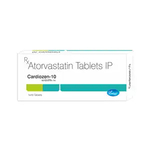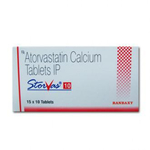caat (ATORVASTATIN)
Introduction to caat
Caat is a medication primarily used to manage cholesterol levels in the body. It helps in reducing the risk of heart-related issues by controlling the levels of bad cholesterol and... See More

What is Caat?
Caat is a medication used primarily to lower cholesterol levels and reduce the risk of heart disease. It works by blocking an enzyme in the liver responsible for making cholesterol, thereby reducing the amount of cholesterol in the blood.

What is the usual dose of Caat?
The usual starting dose of Caat for adults is 10 mg once daily. The dose may be adjusted based on individual response and cholesterol levels, with a maximum recommended dose of 80 mg per day. For children or the elderly, dosing may differ, and it's crucial to follow a healthcare provider's instructions for dosing.

How do I take Caat?
Take Caat once daily, with or without food. It's best to take it at the same time each day. Avoid grapefruit juice, as it can interact with the medication. Follow your healthcare provider's instructions for dosage and dietary recommendations.

For how long do I take Caat?
Caat is used for long-term management of high cholesterol and related conditions. The duration of use depends on individual health needs and response to treatment. It's important to follow your healthcare provider's instructions regarding how long to take this medication.

What is Caat used for?
Caat is used to lower high cholesterol and reduce the risk of heart disease. It helps decrease LDL cholesterol and triglycerides while increasing HDL cholesterol. It is often used alongside diet, exercise, and other lifestyle changes.

How long does it take for Caat to start working?
Caat begins to work within 2 weeks, but it may take up to 4 weeks to see the full effect on cholesterol levels. Individual factors like diet and lifestyle can affect how quickly it works. Follow your healthcare provider's instructions for best results.

Is Caat effective?
Caat is primarily used to lower cholesterol levels and reduce the risk of heart disease. It works by blocking an enzyme in the liver responsible for making cholesterol. Clinical trials have shown that Caat effectively lowers LDL cholesterol and reduces the risk of heart attacks and strokes.

How does one know if Caat is working?
Caat is used to lower cholesterol levels. Its effectiveness is monitored through regular blood tests to check cholesterol levels. A decrease in LDL cholesterol and total cholesterol indicates the medicine is working. Follow your healthcare provider's instructions for regular testing.

How does Caat work?
Caat works by blocking an enzyme in the liver that is responsible for making cholesterol. This action reduces the amount of cholesterol in the blood, helping to lower LDL cholesterol levels and reduce the risk of heart disease.

Who should avoid taking Caat?
Caat should not be used in individuals with active liver disease or unexplained persistent elevations in liver enzymes. It is also contraindicated in pregnant or breastfeeding women due to potential harm to the baby. People with known allergies to Caat should avoid it. Always inform your healthcare provider about your medical history before starting this medication.

Can I take Caat with vitamins or supplements?
Confirmed interactions with Caat include grapefruit juice, which can increase the medicine's levels in the blood, potentially leading to side effects. There is no confirmed need for supplementation due to nutrient depletion by Caat. Always inform your healthcare provider about all medications and supplements you are taking to avoid potential interactions.

Can I take Caat with other prescription drugs?
Caat can interact with certain medications, increasing the risk of side effects. Notable interactions include drugs like cyclosporine, certain antibiotics, and antifungals, which can increase Caat levels in the blood. This can lead to muscle problems. Always inform your healthcare provider about all medications you are taking to avoid potential interactions.

Can Caat be taken safely while pregnant?
Caat is not safe to use during pregnancy and is contraindicated. It can harm the developing fetus, particularly affecting fetal development. Women who are pregnant or planning to become pregnant should avoid this medication and consult their healthcare provider for alternatives.

Can Caat be taken safely while breastfeeding?
Caat is not recommended while breastfeeding, as it is unknown if it is excreted into breast milk and could potentially affect the infant. Consult a healthcare provider for advice on alternative treatments while breastfeeding.

Is Caat safe for the elderly?
Elderly patients may be more sensitive to the effects of Caat, particularly muscle-related side effects. It's important for older adults to have regular monitoring of liver function and muscle health while taking this medication. Always follow a healthcare provider's guidance.

How should I store Caat?
Store Caat at room temperature, away from moisture and light. Keep it in a secure place out of reach of children. Avoid storing it in the bathroom or near a sink to prevent exposure to moisture.

Does Caat make people tired or drowsy?
Fatigue is occasionally reported with Caat use, but it is not common. Most people tolerate this medicine well, and tiredness or drowsiness is not frequently reported. If you experience persistent fatigue, consult your healthcare provider.

Does Caat cause stomach upset?
Caat can occasionally cause gastrointestinal side effects like nausea, diarrhea, or abdominal pain. These effects are usually mild and transient. If you experience severe or persistent symptoms, consult your healthcare provider.

Does Caat affect sleep?
Most people tolerate Caat well, and difficulty sleeping is not commonly reported. If you experience sleep disturbances, consult your healthcare provider for advice.

Does Caat make it hard to think or concentrate?
Most people tolerate Caat well, and difficulty thinking or concentrating is not commonly reported. If you experience cognitive issues, consult your healthcare provider for advice.

Does Caat affect mood?
Most people tolerate Caat well, and changes in mood or increased anxiety are not commonly reported. If you experience mood changes, consult your healthcare provider for advice.

Does Caat interfere with sexual function?
Most people tolerate Caat well, and sexual side effects are not commonly reported. If you experience changes in sexual function, consult your healthcare provider for advice.

Does Caat affect appetite?
Most people tolerate Caat well, and changes in appetite are not commonly reported. If you experience appetite changes, consult your healthcare provider for advice.

Does Caat cause weight gain?
Most people tolerate Caat well, and weight loss or weight gain is not commonly reported. If you experience significant weight changes, consult your healthcare provider for advice.

Does Caat cause headaches?
Headaches are occasionally reported with Caat use, but they are not common. Most people tolerate this medicine well. If you experience persistent headaches, consult your healthcare provider.

Does Caat limit driving?
Most people tolerate Caat well, and it does not typically impair driving. However, if you experience unusual symptoms like dizziness or drowsiness, avoid driving until you know how the medicine affects you. Report any new symptoms to your healthcare provider.

Is it safe to drink alcohol while taking Caat?
Occasional or moderate alcohol consumption is generally considered safe while taking Caat. However, excessive alcohol can increase the risk of liver damage, as both alcohol and Caat can affect liver function. It's advisable to limit alcohol intake to avoid potential liver issues. If you experience any unusual symptoms, consult your healthcare provider for personalized advice.

Is it safe to drink coffee or tea while taking Caat?
Most people tolerate Caat well, and it should not limit your ability to drink caffeinated beverages such as coffee or tea. There are no known interactions between Caat and caffeine that would affect the medicine's effectiveness.

Is it safe to exercise while taking Caat?
Most people tolerate Caat well, and it should not limit your ability to exercise. However, if you experience muscle pain or weakness during physical activity, consult your healthcare provider for advice.

What are Caat possible harms and risks?
A side effect is an unwanted symptom caused by medical treatment. Common side effects of Caat include muscle pain, diarrhea, nausea, headache, and joint pain. These side effects are generally mild and may occur in more than 1 in 10 people. It's important to note that new symptoms can appear when starting any new medication, and they might not be related to the medicine or could be temporary. Always consult a healthcare provider before stopping any medication.
Available in 4 variations

CAAT 80mg Tablet 10s
CAAT 80mg Tablet 10s
Atorvastatin (80mg)
strip of 10 tablets

CAAT 10 Tablet
Atorvastatin (10mg)
strip of 15 tablets

Caat 40 Tablet 10s
Caat 40 Tablet 10s
Atorvastatin (40mg)
strip of 10 tablets

CAAT 20 Tablet 15s
Atorvastatin (20mg)
strip of 15 tablets














.svg)
